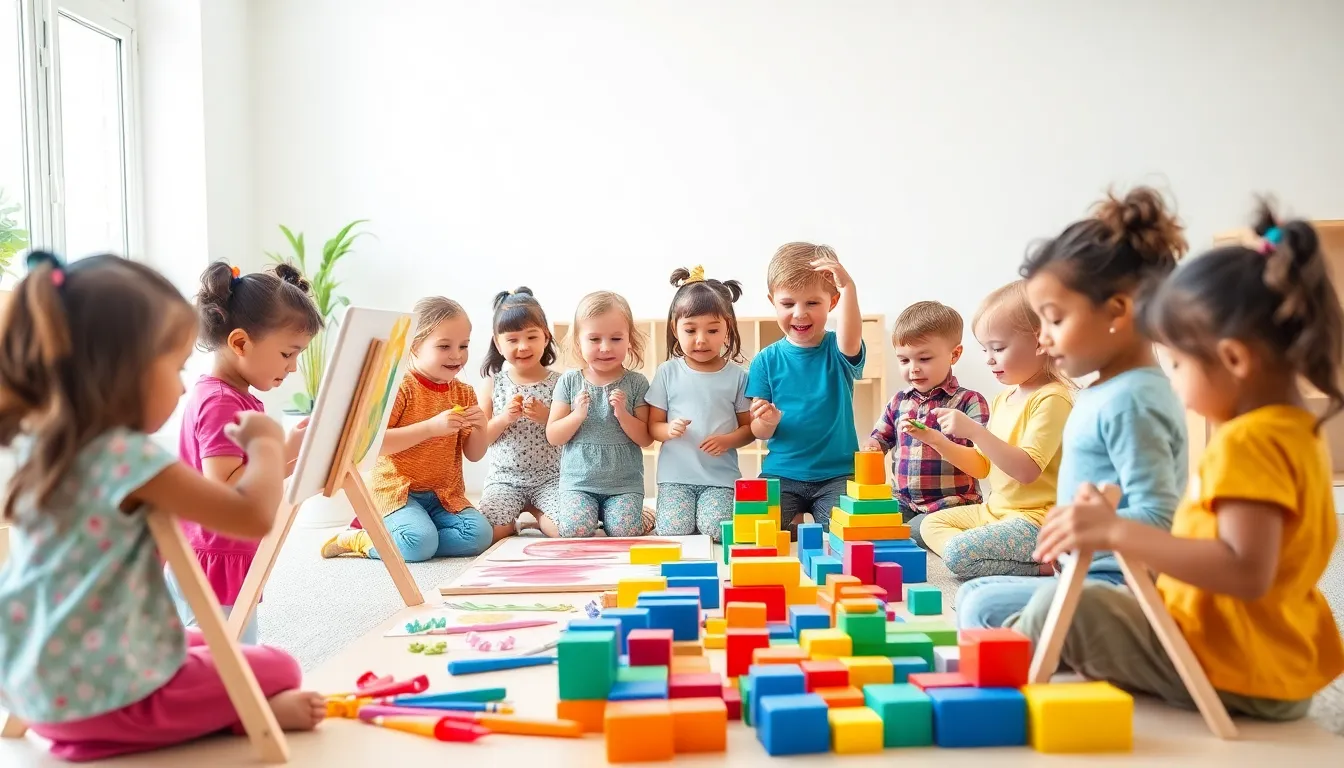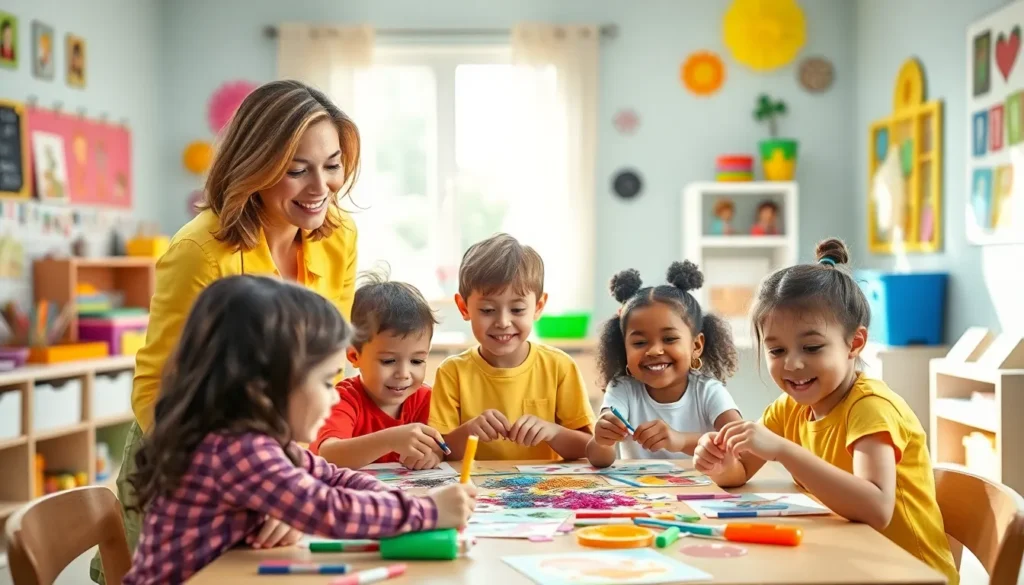Table of Contents
ToggleEvery parent knows that keeping preschoolers engaged can feel like herding cats—energetic, curious, and often a little mischievous! But what if learning could be just as fun as playtime? With the right activities, it’s possible to transform those wild moments into valuable learning experiences.
Imagine a world where counting isn’t just a chore but an adventure through a treasure hunt, or where colors come alive in a messy, paint-splattered art session. Fun learning activities for preschoolers can spark creativity, boost problem-solving skills, and foster a love for learning that lasts a lifetime. Dive into this treasure trove of engaging ideas that’ll keep those little minds buzzing and their giggles echoing. After all, who says education can’t be a blast?
Importance Of Fun Learning Activities For Preschoolers
Fun learning activities play a crucial role in preschool education. Engaging tasks stimulate children’s natural curiosity and promote active participation. Through play, preschoolers develop essential skills like critical thinking, social interaction, and emotional regulation.
These activities foster creativity and encourage imaginative play. Art sessions using colors help children experiment and express themselves. Storytelling activities enhance language skills and improve vocabulary.
Connecting learning with play creates a positive attitude towards education. When children enjoy their experiences, they develop a lifelong love for learning. This enjoyment translates into better retention of knowledge and skills.
Providing opportunities for teamwork helps develop social skills. Activities such as group games encourage sharing, communication, and collaboration. Working alongside peers teaches children how to resolve conflicts and build relationships.
Physical activities enhance motor skills and overall health. Movement-based learning, like dancing or playing outdoor games, promotes physical fitness. Engaging the body while learning keeps energy levels high and attention focused.
Balancing fun and education strengthens foundational skills. Activities that combine both elements ensure holistic development. This approach allows children to build self-confidence and independence.
Ultimately, incorporating fun into learning equips preschoolers with essential tools for future success. Enjoyable experiences create a nurturing environment that supports curiosity and growth. Promoting this cheerful approach to education helps young learners thrive in their developmental journey.
Types Of Fun Learning Activities

Engaging preschoolers in fun learning activities enhances their development and ignites their imagination. Various types of activities can keep children occupied while promoting essential skills.
Creative Play
Creative play includes activities that stimulate a child’s imagination and allow for self-expression. Art projects like painting or crafting encourage exploration of colors and textures. Building with blocks promotes spatial awareness and fine motor skills. Role-playing games, involving costumes and props, help preschoolers navigate social interactions and develop emotional intelligence. Storytelling, whether through books or improvisation, fosters language development and comprehension. By incorporating creative play into daily routines, caregivers can support cognitive and emotional growth.
Physical Activities
Physical activities promote health and well-being in preschoolers while reinforcing motor skills. Outdoor games like tag or obstacle courses enhance coordination and teamwork. Structured activities, such as yoga or dance, introduce children to body awareness and rhythm. Nature walks provide exploration opportunities while developing observational skills. Group sports Foster collaboration and communication abilities. Through these engaging physical activities, children gain confidence and improve overall fitness levels.
Educational Games
Educational games combine learning with play, making difficult concepts more accessible. Board games that involve counting or matching enhance numeracy and literacy skills. Interactive apps often offer opportunities for practicing problem-solving and critical thinking in a fun way. Puzzles challenge preschoolers and boost cognitive development through spatial reasoning. Memory games encourage focus and retention of information. Incorporating educational games into learning routines supports knowledge retention while keeping children entertained.
Benefits Of Engaging Preschoolers In Fun Learning
Engaging preschoolers in fun learning activities provides numerous advantages for their development. Parents and educators can foster growth in key areas through these enjoyable experiences.
Enhancing Cognitive Skills
Fun learning activities significantly boost cognitive skills in preschoolers. Children benefit from activities that promote problem-solving and critical thinking. Engaging in tasks like puzzles and memory games strengthens memory retention and enhances reasoning abilities. Learning through play, such as exploring patterns with blocks or sorting colorful objects, encourages curiosity and creative thought. By incorporating visual arts and sensory play, children’s ability to innovate and understand concepts expands. Activities such as storytelling not only improve language skills but also enhance comprehension and imagination. Cognitive growth thrives in environments that blend fun with education, making learning an enjoyable journey.
Promoting Social Interaction
Social interaction plays a vital role in preschoolers’ development, and fun learning activities foster this essential skill. Collaborative games and group projects create opportunities for children to learn teamwork and cooperation. During play, preschoolers practice sharing, negotiating, and resolving conflicts, which are key components of effective communication. Engaging in role-playing and dramatic play helps children understand different perspectives and emotions. Moreover, these interactions build self-confidence and encourage the expression of thoughts and feelings. Connecting with peers through playful activities nurtures a sense of belonging and enhances social competence, laying the groundwork for healthy relationships in the future.
Examples Of Fun Learning Activities For Preschoolers
Engaging preschoolers in fun learning activities enhances their development and creativity. Here are some examples of interactive and creative experiences.
DIY Learning Crafts
Crafting supports cognitive and emotional growth. Create simple projects using everyday materials, such as paper, glue, and scissors. Kids can make collages by cutting pictures from magazines. They can also explore nature by using leaves, twigs, and flowers in their art. Hands-on crafting strengthens fine motor skills and enhances creativity. Once completed, children can proudly display their crafts, fostering self-esteem. Additionally, these projects often spark conversations about colors, shapes, and textures, further enriching their vocabulary.
Interactive Storytelling
Storytelling captivates children’s attention while promoting language skills. Use puppets, props, or visuals to make stories come alive. Engage preschoolers by asking questions about characters and plot. They can participate by acting out scenes or providing alternative endings. Interactive storytelling encourages imagination and critical thinking. It also enhances listening skills and comprehension as kids follow the narrative. Incorporate familiar stories alongside original ones to make connections, allowing children to express their thoughts and preferences, thereby deepening their love for literature.
Embracing fun learning activities for preschoolers is essential for their development and overall well-being. These engaging experiences not only stimulate curiosity but also foster critical skills like problem-solving and social interaction. By incorporating creative play and physical activities into daily routines, parents can create a vibrant learning environment that nurtures a love for education.
Through these playful adventures, children build confidence and independence while enhancing their cognitive and emotional growth. The balance between fun and learning lays a strong foundation for future success. Ultimately, investing time in these enjoyable activities enriches preschoolers’ lives, making education a delightful journey rather than a chore.




